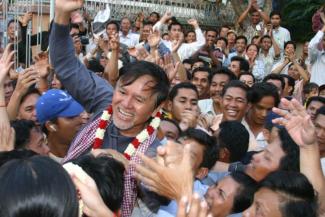Democracy
The path has been cleared for Hun Sen

Cambodian politics is quite straightforward: the Cambodian People’s Party (CPP) is the ruling party, the prime minister is called Hun Sen, and the opposition is an ambitious but rather hopeless undertaking. It’s been this way for decades. In power since 1985, Hun Sen is the world’s longest serving prime minister – and he has no plans to give up this position that, apart from power, brought him huge wealth.
Nominally a democracy, Cambodia regularly holds general elections, and the next ones are due in July. “Irregularities” of all kinds are commonplace. This time, however, Hun Sen seemed to fear the opposition more than before. In 2013, the CNRP – a merger of the Sam Rainsy Party and the Human Rights Party – already was a serious competitor of CPP. It got 44.5 % of the vote compared to the CPP’s 48.8 %. Municipal elections yielded a similar result in 2017.
To be on the safe side, Hun Sen’s government made the Supreme Court dissolve the CNRP in November on the grounds of plotting a revolution. The main opposition party thus lost all of its elected representatives at the local and national level; 118 of its officials are banned from politics for five years. The party‘s seats in parliament were distributed to other parties. Senior CNRP members have filed a Supreme Court complaint against the decision, but that is probably just part of the party’s death struggle.
Charles Santiago, the chairman of the ASEAN Parliamentarians for Human Rights, called the dissolution of the CNRP “the final nail in the coffin for Cambodian democracy”. The European Union considers the ruling to be arbitrary, and as a result, the election “cannot be seen as legitimate”. The EU and the USA withdrew their support of the election. Cambodia does not depend on EU and US support however since it enjoys support from other powers as well, including the government’s “best friend” and biggest foreign donor China. Beijing immediately pledged more money to fill the gap.
There is little reason for hope that true justice and democracy will prevail soon in the small Southeast Asian country. Kem Sokha, the head of the CNRP, was arrested in September on charges of treason for allegedly conspiring with the USA to overthrow the government (see my blog post of 6 September 2017). He faces up to 30 years in prison. In the aftermath, many senior party members fled the country in fear. After the CNRP dissolution, Kem Sokha said through his lawyer that he was unlikely to seek release from pre-trial detention because he had “no faith” in the country’s court system. In a new year’s address he called for free and fair elections, national unity and non-violence to solve the political crisis.
The authoritarian regime is cracking down on other critical voices too. Media outlets were shut, among them the English language Cambodia Daily. NGOs are being intimidated and threatened. One of them is the Cambodian Center for Human Rights (CCHR) that Kem Sokha had founded in 2002 “to promote and protect democracy and human rights in Cambodia”.
It’s been a long and uphill struggle. Even imprisonment is not a new experience for Kem Sokha: he was arrested in December 2005 ahead of senate elections in January 2006 and imprisoned for harming the government. After broad protests, at national and international levels, he was set free ahead of the visit of a high-ranking US diplomat.
Today, Hun Sen’s authoritarian rule is more consolidated than ever. He doesn’t hide his will to run Cambodia for many more years. He is only 65 years old. That would give him 28 more years if he follows the example of former Zimbabwean President Robert Mugabe, who was forced to hand over the baton at age 93 in November last year (see comment by Henning Melber in D+C/E+Z e-Paper 2017/12, p. 12). For the time being, the path for Hun Sen has been cleared.








